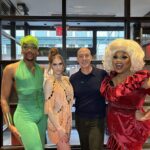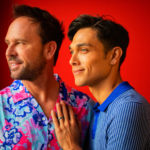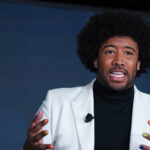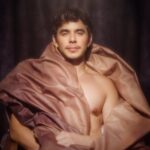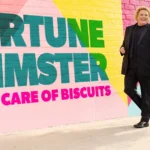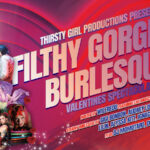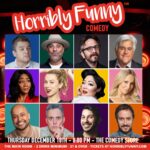Actor, playwright, and voiceover artist JP Karliak is just about as colorful as some of the characters he’s played. Having been on the stage and screen, his voice work has now taken center stage. He’s voiced some big-name characters like Wile E. Coyote, Willy Wonka, the Tin Man, Green Goblin, the Vision, Loki, Netflix’s Boss Baby, and more. This season, his star got a major bump with not one, but two major roles. He brought to life the first non-binary lead mutant Morph for the highly anticipated Disney+/Marvel series X-Men ’97. If that wasn’t high profile enough, he also took on the role of probably the most iconic comic villain ever, The Joker for the brand-new expansion pack for the hit video game Suicide Squad Kills the Justice League.
His bigger-than-life personality and eyes on the spotlight belie his quiet upbringing in a small town close to Scranton, Pennsylvania. True to his destiny, getting bitten by the entertainment bug was inevitable.
Although it’s a small town, we still had things to do like movie theaters, which I went to a LOT. And Dunmore is really only two hours and change outside of New York, so I also got to see a lot of shows. My first New York theatre experience was Guys & Dolls, and I was awestruck by the whole production. This only compounded my interest in “seeing my name in lights” as my mother reminds me was my earliest childhood desire. So, the bug bit me numerous times over the years.
JP was raised in a Catholic household. And not just any Catholic household, but Byzantine Catholic, known for its love of tradition and being very strict. As he began to realize that he wasn’t like the other boys, he also began to realize that his lifestyle was not the best match for the environment around him.
I had a massive crush on my childhood best friend, and I think it was somewhere around 5th grade when I realized all the time we spent playing make-believe with him as the hero and me as both the villain and the damsel in distress was not something most kids did. Especially when I’d “tend to his wounds.” Although my parents probably realized it first, when I came into our living room for one of my “performance nights” dressed as Carol Channing. Like, duh.
My parents were fairly devout, so we definitely clashed over my queerness, and it took many years for them to understand. My mother came around first, she was always the more tender of my parents, but my dad was much more set in his ways and what masculinity was all about. I was fortunate that he saw my solo show (which, amongst other things, really got into my journey as a queer person) a few years before he passed away, and that really opened up his eyes. We did have some time, though not nearly enough, of him accepting me in some way.
Not only was JP discovering his true self on his sexual identity journey, but he was also finding himself as an adopted child. He was adopted when he was one month old.
I’ve always known I’m adopted. I don’t remember when I was told or how, I’ve just always known. So that was a given. The queerness part was much trickier to navigate due to my family’s religion and my hometown’s (and the 90s’) conservative viewpoints. But as I grew up, I could look back and see where my strong desire for acceptance and validation was fueled by both being adopted and being queer.
Part of his journey was finding his birth mother. After working with the agency that arranged the adoption, he wrote to his birth mother, who agreed to meet with him. Part of the puzzle as to his personality and make up was solved. His two mothers couldn’t be more different. We wrote his journey down into an award-winning one-man show titled Donna/Madonna. The show was a critical and audience success, winning him Best One Man Show at the United Solo Theatre Festival in New York.
The show began as a love letter to both of my mothers – adoptive and birth. I really am a fairly even split of both of them – nature vs nurture – and I wanted to celebrate the two women who contributed to who I am and how different yet similar they are.
While my main goal was for them to enjoy it, it was a nice surprise that many other people did too, and I toured with it for a few years. I loved doing that show, and I think it exhibited such a clear picture of who I was at that time. But when I read it over again recently, I thought about how much I’ve changed (along with the whole world!) in the 15 years since I wrote it. I wrote and performed the show while identifying as a gay man, and that has evolved into being a genderqueer/queer human – with a very different hair color. Sometimes that makes me feel the urge to write another show! And sometimes it makes me feel Donna/Madonna was a wonderful experience to let lie. Who knows how I’ll feel tomorrow?
He originally started studying drama at the Catholic University of America in DC, but left to study at USC’s School of Theatre to be closer to the entertainment action. His life would lead him to voice acting, once again bitten by the bug.
The same year my young brain started comprehending that one day I would need a job, I saw Aladdin. I loved Robin Williams’ work, and I knew I wanted to do that. I reasoned that Robin was a major Hollywood star, so I’d have to become a major Hollywood star before they ALLOWED me to do voiceover. And that was the mindset I took well into my college career before I discovered how voiceover worked. Did I mention I’m from a small town?
After I graduated, I started pursuing on-camera work and voiceover at the same time. Over time, on-camera yielded little more than a few typecast roles that were, let’s say, stereotypically swishy. Meanwhile, in voiceover, I was playing a loudmouth Aussie rocker werewolf, a few superheroes, and (eventually) Wile E. Coyote. There was so much more freedom and belief in my abilities to stretch. So, I left on-camera behind and have been on nothing but the VO train ever since.
Having the opportunity to voice some of animation’s biggest characters, he’s been able to mesh his acting skills while paying homage to the voice work before him in his creative process.
A lot of the characters I’m most known for are legacy characters, so some of that initial work is listening back to what’s been done before, and – based upon how close or how loosely production wants the voice to adhere to the original – start honing in on the voice from there. After that, it’s really just reading the script and getting a sense of how my point of view, and sense of humor, fits into that.
Comic books weren’t a big part of his life, but he was always a fan of the movies and TV series based on them. Now that he is entrenched in the Marvel and DC universes, he has gotten sucked into the lore. Playing Morph, the shape-shifting mutant, is big for the LGBTQ community. This marks the first non-binary lead character in an animated superhero series. What was most important to JP, as an actor and a gay man, in putting the character together?
Grounding him in reality. This was a character where I didn’t want to “do a voice,” I really just wanted to use my own. Morph is a mutant, a shapeshifter, and has been mind-controlled – all sorts of fantastical things. But at his core, he is a misunderstood person who felt betrayed by his friends, experienced serious psychological trauma, and then went through a long period of recovery to come to terms with who he is and what he’s experienced. Not to mention, he uses jokes and a sense of humor to mask a lot of that pain. I think that’s something so many queer people identify with, and something I really loved bringing to life.
X-Men ‘97 has come with a lot of attention, picking up where the 1997 finale of X-Men: The Animated Series ended. As much as the media outlets picked up the story and series as the hottest thing of the season, so did comic book fans. They took to the message boards with opinions on casting and storylines. As much support as there is for the growing LGBTQ representation in the comic book world, sadly, there are detractors saying the world of X-Men is getting too woke. Ironic, considering the message of the series.
I would ask them to look at the real world a little closer. It’s a very diverse place out there, with people of all different backgrounds, identities, body types, abilities, or disabilities …. To assume that every single one of them has to settle for white, straight, cisgender, ripped, slim, and non-disabled as the default that everyone needs to admire and idolize …. Gang, that is propaganda of oppression right there.
Every kid, every person, deserves to turn on the TV or open a comic book and see a hero that they identify with on a meaningful level. And for queer kids who are the targets of all manner of hate at this moment, they need positive, affirming representations in media. We must show them there’s nothing wrong with them and they are exactly who they are meant to be.
Barely a week went by between the premiere of X-Men ‘97 and then JP’s version of the Joker hit the market. A heavy-pressure gig indeed, considering the names that have taken on that role.
Playing the Joker is a field of landmines. And in each one of those many mines is an iconic performance of the Joker that millions of people think is the definitive version. I have those opinions myself! I’ve loved the Joker since I was little, watching reruns with Caesar Romero, seeing Jack Nicholson, and later Heath Ledger, on the big screen, and then watching every scrap of Mark Hamill’s performances. Iconic! I also am a big fan of John DiMaggio, Tony Hale, and Kevin Michael Richardson’s takes.
To enter the arena of so many great Joker performances is tricky, to say the least. What made this version kind of freeing is that he’s an Elseworld Joker, never seen before, and with a whole other reality as his background. So I could take little bits of what I loved from all the other Jokers and make this one my own. And I don’t think I’m speaking out of turn here to say he’s definitely a touch queerer than most other portrayals, so it was fun to bring that to the table as well.
In addition to his screen work, JP is an avid activist in both the queer and political world. He founded Queer Vox, “a non-profit organization providing training and professional support for LGBTQIA+ voice actors in the entertainment industry while advocating for equitable opportunities and authentic representation in voice performance work.” For JP, employing queer artists in queer roles is imperative.
I think what’s key to this argument is understanding this is not about talent. We have all seen cis/straight humans play queer roles in TV or film and found them deeply moving (my personal favorite is Bill Hader in The Skeleton Twins. So good!). But this is about the “business” part of “show business.” Queer people deserve to have an equal opportunity to make a living as voiceover actors.
The industry is lopsided in that cis/straight folks can play anything under the sun, but queer people aren’t even allowed to play themselves, let alone cis/straight roles. And having access to the full gamut of roles is what allows a queer person to make a long-lasting career that goes beyond just being the diversity checkmark du jour. We deserve to earn wealth by telling the stories that are about us. But we also deserve to make a living alongside our cis/straight colleagues.
LGBTQ+ folks make up less than 10% of the population. Trans people make up a fraction of that number. There’s not a lot of us. Even so, getting a proportional amount of representation still eludes us and remains an uphill battle. It’s getting better, and I applaud the companies that have worked with Queer Vox or have taken the initiative on their own to do better. But we still have a long way to go. I hope one day we all can audition for whatever roles we wish. But as long as that imbalance of access exists, that day is far off indeed.
JP also co-founded NerdsVote, a non-partisan organization to get everyone from the nerd groups – cosplayers, con-goers, gamers, and pop culture fans of all kinds to get out and vote. With everything going on in our current climate, how does JP think we best get the voting message across without taking sides, and shouldn’t now be the time when being non-partisan is the least of our worries?
Courtenay Taylor (my co-founder) and I are anything but non-partisan personally. But NerdsVote has to be. Logistically because comic conventions usually don’t permit partisan politics on the premises. But more broadly, we’re responding to the needs of an audience disaffected by politicians, divisiveness, and broken promises. We just want to bring them back to the foundational level: “You have the power to make change. And it only happens if you make it happen.” Registering and voting is the first small step. Once somebody takes that, we believe the social justice issues that matter to them will lead them into deeper involvement.
What JP wants most from his work is for audiences to get a sense of belonging. A safe space. And his message to his fans?
It’s simple, but it’s deeply felt: thank you.
You can follow JP on Instagram: @JPKarliak
Last modified: May 15, 2024








